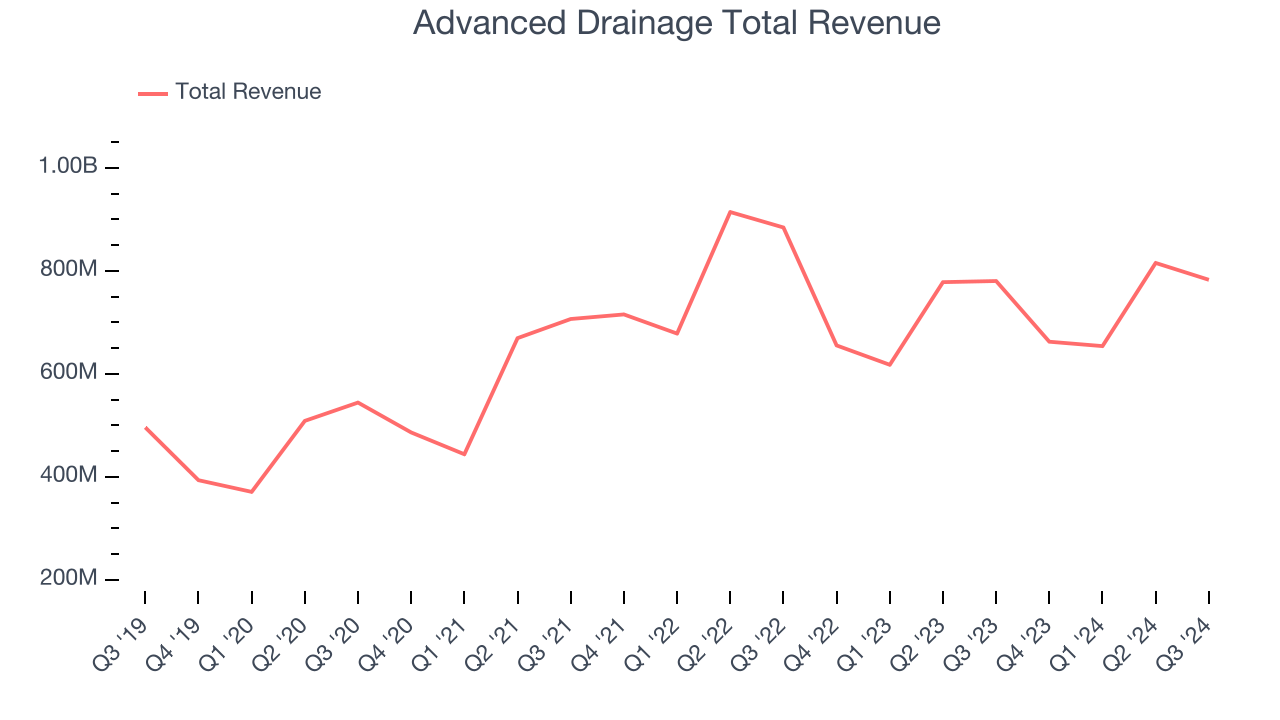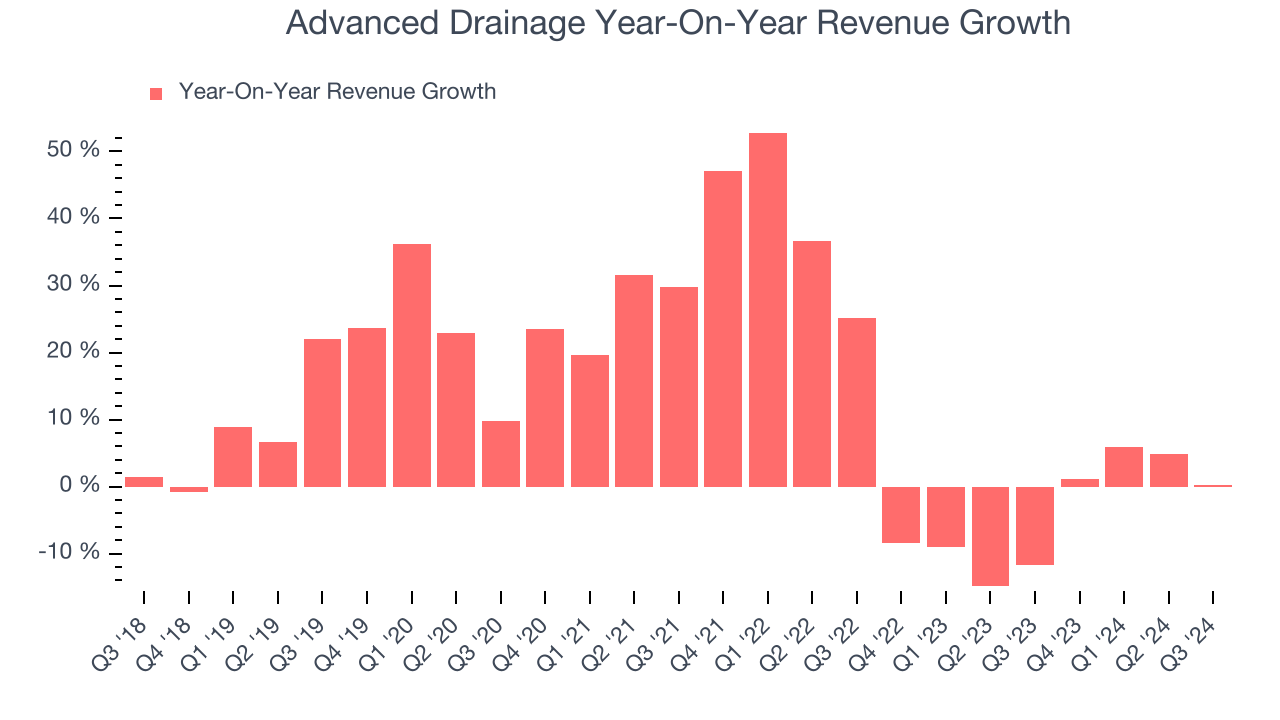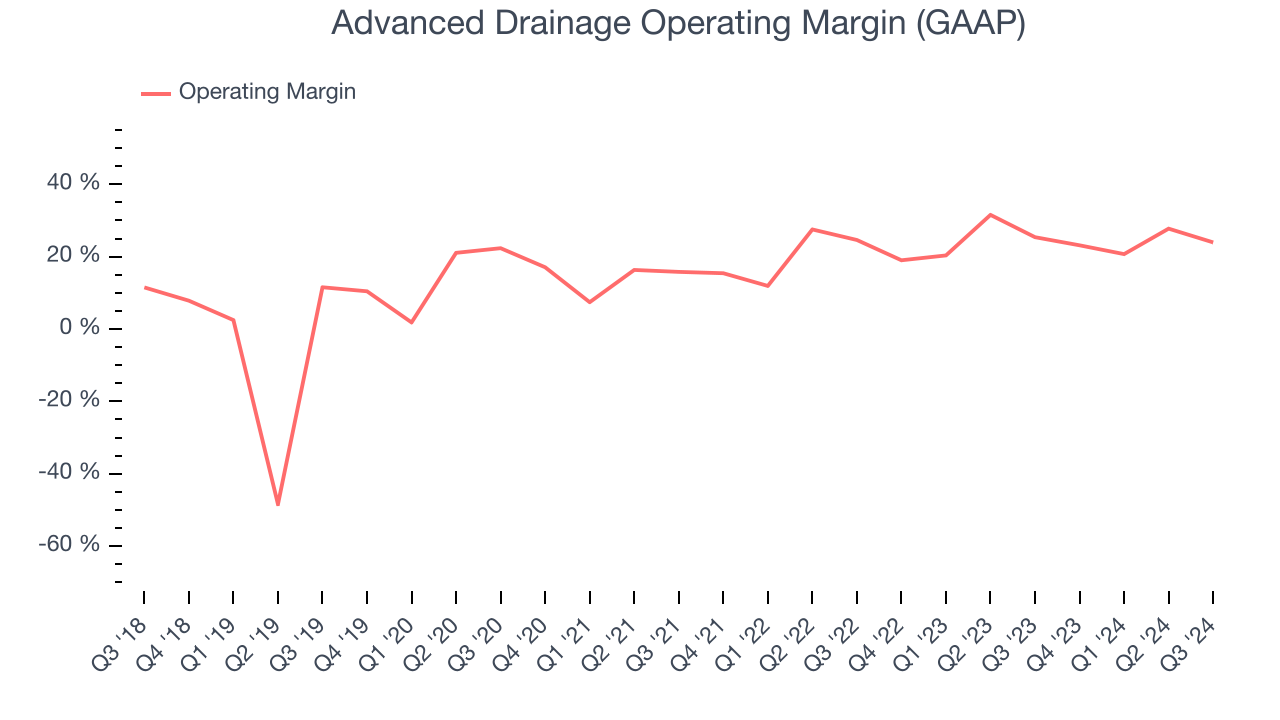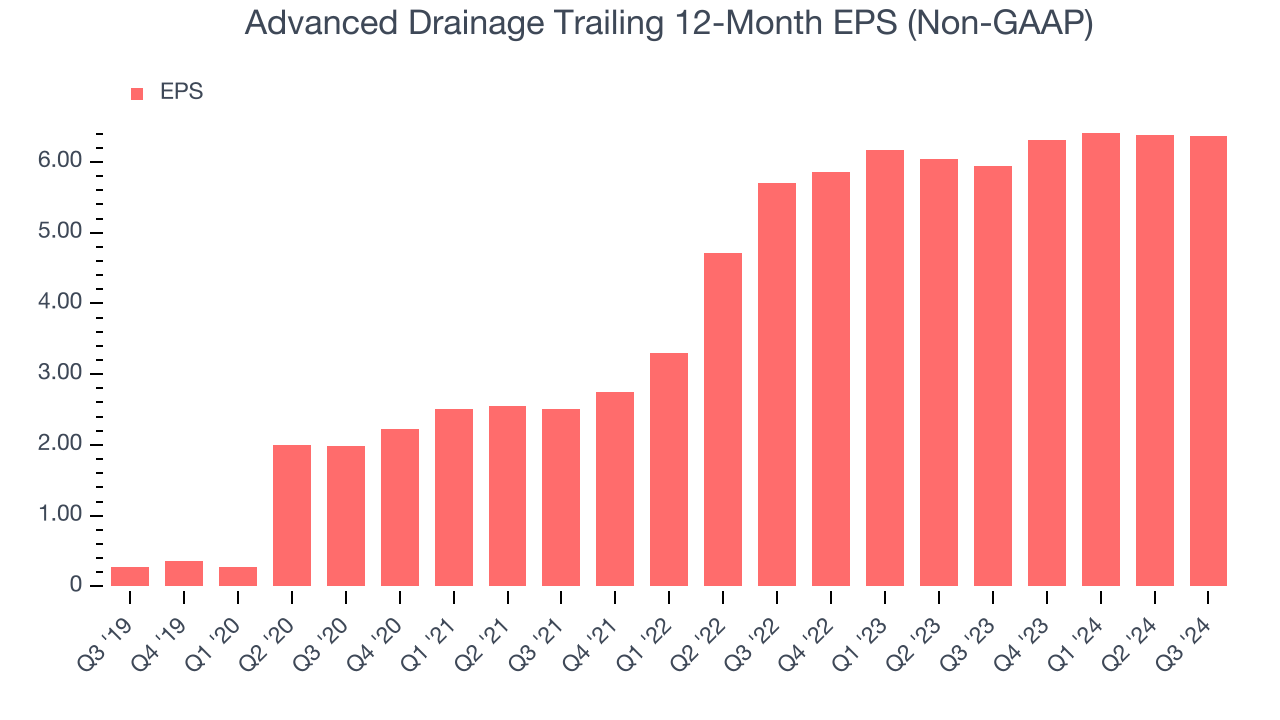
Water management company Advanced Drainage Systems (NYSE: WMS) fell short of the market’s revenue expectations in Q3 CY2024, with sales flat year on year at $782.6 million. The company’s full-year revenue guidance of $2.94 billion at the midpoint came in 1.6% below analysts’ estimates. Its non-GAAP profit of $1.70 per share was also 10.2% below analysts’ consensus estimates.
Is now the time to buy Advanced Drainage? Find out by accessing our full research report, it’s free.
Advanced Drainage (WMS) Q3 CY2024 Highlights:
- Revenue: $782.6 million vs analyst estimates of $819.4 million (4.5% miss)
- Adjusted EPS: $1.70 vs analyst expectations of $1.89 (10.2% miss)
- EBITDA: $245.6 million vs analyst estimates of $260.7 million (5.8% miss)
- The company dropped its revenue guidance for the full year to $2.94 billion at the midpoint from $2.98 billion, a 1.3% decrease
- EBITDA guidance for the full year is $900 million at the midpoint, below analyst estimates of $960.5 million
- Gross Margin (GAAP): 37.6%, down from 38.8% in the same quarter last year
- Operating Margin: 23.9%, down from 25.4% in the same quarter last year
- EBITDA Margin: 31.4%, in line with the same quarter last year
- Free Cash Flow Margin: 14.4%, down from 22.3% in the same quarter last year
- Market Capitalization: $12.33 billion
Scott Barbour, President and Chief Executive Officer of ADS commented, "The second quarter results reflect strong demand at Infiltrator as well as the ADS residential and infrastructure end markets. Continued choppiness in the non-residential end market impacted revenue from both pipe and allied products which, combined with significant storm events, resulted in revenue flat to the prior year. Importantly, we were able to manage through demand fluctuations and unfavorable price/cost to maintain a robust Adjusted EBITDA margin of 31.4%, underscoring the resiliency of the ADS business model. "
Company Overview
Originally started as a farm water drainage company, Advanced Drainage Systems (NYSE: WMS) provides clean water management solutions to communities across America.
HVAC and Water Systems
Many HVAC and water systems companies sell essential, non-discretionary infrastructure for buildings. Since the useful lives of these water heaters and vents are fairly standard, these companies have a portion of predictable replacement revenue. In the last decade, trends in energy efficiency and clean water are driving innovation that is leading to incremental demand. On the other hand, new installations for these companies are at the whim of residential and commercial construction volumes, which tend to be cyclical and can be impacted heavily by economic factors such as interest rates.
Sales Growth
Examining a company’s long-term performance can provide clues about its business quality. Any business can put up a good quarter or two, but the best consistently grow over the long haul. Over the last five years, Advanced Drainage grew its sales at an exceptional 14.2% compounded annual growth rate. This is encouraging because it shows Advanced Drainage’s offerings resonate with customers, a helpful starting point.

Long-term growth is the most important, but within industrials, a half-decade historical view may miss new industry trends or demand cycles. Advanced Drainage’s recent history marks a sharp pivot from its five-year trend as its revenue has shown annualized declines of 4.5% over the last two years. 
We can dig further into the company’s revenue dynamics by analyzing its most important segments, Pipe and Infiltrators, which are 52.5% and 16.4% of revenue. Over the last two years, Advanced Drainage’s Pipe revenue (thermoplastic corrugated pipes) averaged 7.3% year-on-year declines while its Infiltrators revenue (wastewater treatment systems) averaged 1.4% declines.
This quarter, Advanced Drainage’s $782.6 million of revenue was flat year on year, falling short of Wall Street’s estimates.
Looking ahead, sell-side analysts expect revenue to grow 5.6% over the next 12 months, an improvement versus the last two years. Although this projection illustrates the market believes its newer products and services will fuel better performance, it is still below average for the sector. At least the company is tracking well in other measures of financial health.
Here at StockStory, we certainly understand the potential of thematic investing. Diverse winners from Microsoft (MSFT) to Alphabet (GOOG), Coca-Cola (KO) to Monster Beverage (MNST) could all have been identified as promising growth stories with a megatrend driving the growth. So, in that spirit, we’ve identified a relatively under-the-radar profitable growth stock benefitting from the rise of AI, available to you FREE via this link.
Operating Margin
Operating margin is a key measure of profitability. Think of it as net income–the bottom line–excluding the impact of taxes and interest on debt, which are less connected to business fundamentals.
Advanced Drainage has been a well-oiled machine over the last five years. It demonstrated elite profitability for an industrials business, boasting an average operating margin of 20.4%. This result isn’t too surprising as its gross margin gives it a favorable starting point.
Looking at the trend in its profitability, Advanced Drainage’s annual operating margin rose by 8.9 percentage points over the last five years, as its sales growth gave it immense operating leverage.

This quarter, Advanced Drainage generated an operating profit margin of 23.9%, down 1.4 percentage points year on year. Since Advanced Drainage’s operating margin decreased more than its gross margin, we can assume it was recently less efficient because expenses such as marketing, R&D, and administrative overhead increased.
Earnings Per Share
We track the long-term change in earnings per share (EPS) for the same reason as long-term revenue growth. Compared to revenue, however, EPS highlights whether a company’s growth was profitable.
Advanced Drainage’s EPS grew at an astounding 88.4% compounded annual growth rate over the last five years, higher than its 14.2% annualized revenue growth. This tells us the company became more profitable as it expanded.

We can take a deeper look into Advanced Drainage’s earnings quality to better understand the drivers of its performance. As we mentioned earlier, Advanced Drainage’s operating margin declined this quarter but expanded by 8.9 percentage points over the last five years. This was the most relevant factor (aside from the revenue impact) behind its higher earnings; taxes and interest expenses can also affect EPS but don’t tell us as much about a company’s fundamentals.
Like with revenue, we analyze EPS over a shorter period to see if we are missing a change in the business.
For Advanced Drainage, its two-year annual EPS growth of 5.6% was lower than its five-year trend. This wasn’t great, but at least the company was successful in other measures of financial health.In Q3, Advanced Drainage reported EPS at $1.70, down from $1.72 in the same quarter last year. This print missed analysts’ estimates, but we care more about long-term EPS growth than short-term movements. Over the next 12 months, Wall Street expects Advanced Drainage’s full-year EPS of $6.36 to grow by 10.7%.
Key Takeaways from Advanced Drainage’s Q3 Results
We struggled to find many strong positives in these results. Its revenue missed and its EBITDA fell short of Wall Street’s estimates. Guidance was also lowered, which is always a bad sign. Overall, this was a weaker quarter. The stock traded down 9.1% to $144.35 immediately following the results.
Advanced Drainage underperformed this quarter, but does that create an opportunity to invest right now? The latest quarter does matter, but not nearly as much as longer-term fundamentals and valuation, when deciding if the stock is a buy. We cover that in our actionable full research report which you can read here, it’s free.






